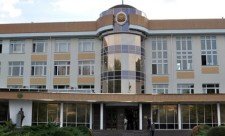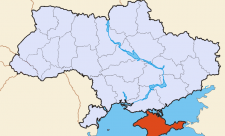 The last week was full of international events. The USA and Europe showed solidarity. The EU implemented new sanctions against Russia. However, the meeting of the Normandy quartet leaders in Minsk and signing the agreement regarding Donbass became the culmination.
The last week was full of international events. The USA and Europe showed solidarity. The EU implemented new sanctions against Russia. However, the meeting of the Normandy quartet leaders in Minsk and signing the agreement regarding Donbass became the culmination.
Merkel and Obama hold consultations regarding Ukraine
On Monday, February 9, the chancellor of the FRD Angela Merkel arrived on a visit to Washington. Consultations regarding the situation in Ukraine became the main theme of the meeting of Merkel and Obama. While the dialogue, the leaders of two states concluded that the conflict in the East of Ukraine was possible to solve only in a peaceful way and that it was too early to curtain sanctions again Russia.
“Sanctions against Russia should be performed to the full extent until Russia fulfills claimed obligations,” the president Obama stated.
In regard of the arms delivery, the American president said that “he hasn’t made decision regarding combat weapon deliveries in Ukraine, however, he has asked his advisers to consider such a possibility in case if diplomacy fails.” At the same time, he noted that providing Ukraine with lethal defensive arms is only one of the possible options to resolve the conflict in Donbass.
Speaking at the press conference in the White House, the chancellor of Germany emphasized once again that the EU advocates for the peaceful regulation of the conflict in the East of Ukraine. “We will make every effort to find a diplomatic solution of the conflict,” Mrs. Merkel said.
The European leader assured Washington that they would always remain the allies and present the united front: “Nothing is able to disjoint America and Europe! The union between America and Europe will persist in any case, even if we disagree on certain matters.”
The EU implements new sanctions against Russia
On Tuesday, the Council of Ministers on Foreign Affairs of the European Union extended the list of sanctions against Russia in accordance to the events in Ukraine, but postponed its implementation expecting the meeting in Minsk until February 16.
“We have discussed and adopted the list of additional sanctions that consists of 19 private persons and 9 legal entities, which will come under assets freeze and visa ban… In order to give a chance for our diplomatic efforts, we decided with one voice to postpone implementation of these sanctions till Monday, February 16,” the representative of the EU on foreign affairs Federica Mogherini stated.
Angela Merkel explained that these sanctions became the reaction to the events of January 24 in Mariupol, where as a consequence of shellfire from the separatists’ side 31 people perished and 108 have been wounded. Besides that, possibility of new sanctions against the Russian Federation is not excluded in case it is necessary, she added.
In his turn, the president of France François Hollande assumed that there is a probability of relaxation of the further sanctions against Russia in case if the Russian part complies with its obligations.
Negotiations in Minsk
The beginning of the negotiating process has shown that the way to the consensus would not be easy. There was the meeting of the deputy ministers of foreign affairs of the Normandy quartet (Russia, Germany, France, Ukraine) that lasted for about seven hours and ended up in restrained phrases about “constructability” in Berlin.
Negotiations of the contact group on Ukraine, consisting of the ex-president of Ukraine Leonid Kuchma, the ambassador of Russia in Ukraine Mikhail Zubarov, the representative of the OSCE Heidi Tagliavini and leaders of the so called DNR and the LNR, were held in harsh conditions. According to the diplomats, who have been present during the negotiations, the agreement has been barely achieved. The leaders of the self-declared republics were refusing to sign the document, however, eventually, not without collaboration of the president of the Russian Federation, as the chancellor of the FRG Angela Merkel stated, they agreed to put their signatures to the “Comprehensive set of measures for the purpose of Minsk agreements”.
In the evening of February 11, the meeting of the heads of states of the Normandy quartet took place in Minsk. Almost everything indicated the difficulties of the negotiations. The president of Ukraine Petro Poroshenko, the president of the Russian Federation Vladimir Putin, the chancellor of the FRD Angela Merkel and the president of France François Hollande were discussing conditions of the peace agreement and ways of its realization within 17 hours. As the result, the agreement was adopted in the morning of February 12.
The main conditions of the agreement are: cession of fire, withdrawal of the heavy armament (within 16 days), release of hostages and their exchange “all for all”(within three weeks), amnesty of all the participants in military operations in the Donetsk and Lugansk regions, pullout of all the foreign militia groups, restoration of the social and economical connections, holding of the local elections, the constitutional reform considering the special status of the self-declared republics, restoring control over the border by Ukraine in case of compliance with obligations regarding the constitutional reform.
Following the results of the negotiations, the president of Ukraine Petro Poroshenko announced that the negotiations were on the edge of a breakdown, but Ukraine did not accept the ultimatums and carried out the point of the unconditional cession of fire.
The European leaders expressed satisfaction regarding signature of the peaceful agreement, at the same time they were skeptical, saying that signing of the agreements does not guarantee their fulfillment.
“We have a sparkle of hope, we coordinated implementation of the Minsk protocols. However, of course, real steps should be applied and there are big obstacles in front of us. But following the result, I can say, that points we achieved now give us a lot more hope than it would be if we didn’t manage to achieve it. That’s why, I can say: the initiative proved itself,” Angela Merkel said.
In his turn, the French president noted that the agreements do not guarantee the long-term results.
“The next days will be especially important. We should proceed the necessary pressurizing and show unsleeping vigilance for the sake of saving peace in Ukraine. We are on the right way,” François Hollande emphasized.
During the meeting in Minsk, the parties agreed on the further tripartite negotiations (the European Union, Ukraine, and Russia) regarding implementation of the agreement and free-trade zone between the EU and Ukraine.
What kind of peace should be expected?
Minsk agreements look like a step towards achieving peace in Ukraine. At the same time, the agreements themselves leave many issues.
The first one is the cession of fire. Already now it is obvious that the complete and unconditional cession of fire didn’t happen. Battles in the Debaltsevo area continue. It is enough to look at the scheme of the railway traffic of the Donetsk region to understand why. Debaltsevo is one of the most important transport hubs of Donbass. If terrorist capture it, they will get control over the main traffic arteries of the region. There is also a visible interest in it from Russia that during the meeting of Security Council of the UNO insists that Ukraine should withdraw its troops from the contact line first, and that would make the city an “easy prey” for the combatants.
The next point is liberation of hostages. Right after the signing of the agreement in Minks, the president Poroshenko asserted that Nadezhda Savchenko would be liberated. However, the Russian part was not in a hurry to liberate the Ukrainian pilot insisting that her fate is going to be decided exclusively through the court.
There are the same questions to the amnesty. The Ukrainian authorities insist that the amnesty will not be applied regarding the ones, who committed grave crimes, although the Minsk agreements do not contain any exceptions. Such kind of announcements enables the representatives of the DNR and the LNR to accuse the Kiev authorities of non-compliance with agreements.
The issue of the restoration of the Ukrainian control over the border interrelated with holding of the local elections and constitutional reform can become another problem. In fact, it will mean that Ukraine recognized the “DNR” and the “LNR” that official Kiev called as the terrorist organizations many times. Following the Minks agreements, the local authorities will receive the right to form their police detachments that will lead to legalization of the armed gangs on the territory of the Donetsk and Lugansk regions. But Kiev is committed to finance the elections and provide social benefits in the region.
The Minsk agreements are barely possible to call as victory of Ukraine. They look more like an attempt to make maximal concessions to Putin in order to terminate the military actions in the East of Ukraine. Kiev does not have any control over Donetsk and Lugansk, military actions take lives of thousands of soldiers, and economy collapses rapidly. It was an attempt to make a step towards peace, but whether it worked out or not, we are going to find out in the nearest future. But even now it is obvious that Russia is not going to stop until it carries its point. “Kremlin presumes on implementation of all the items of the document on regulation of the situation in Donbass,” the Putin’s press secretary stated after the negotiations in Minsk. Although he added that Russia isn’t a participant of the conflict and does not have to directly comply the set of measures on regulation of the situation in Donbass, at the same time ignoring facts of participation of the Russian military servicemen in the military actions on the terrorist’s side.
Andrey Trutenko












